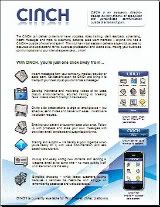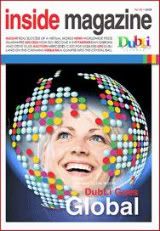Originally posted by "antipaper" Mobile Internet Market to Eclipse Desktop Internet The big wheel keeps on turning …There are 3 stories below, all about the future of smart fone applications. It seems like a logical step forward in technology that we’ll soon do everything via mobile. If you’ve been paying attention, you know this is DubLi’s next big focus. The most substance is in the third article – if you don’t want to read the whole thing, here are the key quotes:
JC 1 – http://news.zdnet.com/2422-19177_22-372900.html?tag=nl.e539 The future of… check depositsA bank in your back pocketDec 14, 2009 7:29 AM PSTTired of carrying checks in your wallet because you can’t find the time to cash them? Texas-based USAA bank has developed a mobile application that allows customers to make deposits using an iPhone. ZDNet correspondent Sumi Das explains how mobile banking could put an end to those time-consuming bank branch visits. 2 - http://www.search-internetmarketing.com/2010/02/mobile-ticketing-taking-off-15-billion-sold-by-2014/ Mobile Ticketing Taking Off: 15 Billion Sold by 2014Posted on 03 February 2010Buying and selling tickets is another business that’s slowly being migrated over to our mobile devices. Whether it’s a movie ticket, concert ticket, plane ticket, or something else, there are a number of companies now offering digital alternatives to the tree-killing paper printouts of days past. In a new study by Juniper Research, analysts predict that the market for mobile ticketing will reach 15 billion delivered tickets by the year 2014.According to Juniper, a little over 2 billion tickets were sold this past year. That makes the forecast of 15 billion by 2014 a notable jump which points to consumers’ ever-increasing desire to perform business transactions like mobile ticket purchases using their mobile phones and other handheld devices. Mobile ticketing initiatives benefit both parties, the ticket issuer and the purchaser. Consumers win because a digitized ticket accessible via their handheld is a convenience. (Just think: how many times have you left the house without your tickets, having to turn around and retrieve them or miss the event altogether?) For ticket sellers, not having to deal with the cost of printing tickets can provide a huge savings. Yet despite the multi-billion increases year-over-year, this market still has a way to go. “Although 15 billion sounds large,” notes the report’s author Howard Wilcox, “it is in fact it a small percentage of total tickets issued — there is plenty of scope for innovative solutions to penetrate this market.” Wilcox sees the next steps for the mobile ticketing industry as encompassing more widespread purchasing via mobile phones and NFC-based ticketing. Mobile Ticketing in the Real WorldOver on online marketing site MarketingVOX, they’ve detailed several real-world examples of mobile ticketing including Southwest Airlines’ iPhone app which allows for mobile ticket purchases, the upcoming NBA All-Star Game in Dallas which is offering special tickets to T-Mobile Android phone owners, AMC movie theaters’ pilot program for mobile movie tickets, and MovieTickets.com’s paperless ticket test in Chicago.What’s interesting about the U.S.-based initiatives detailed above is what early stages so many are in. Even though 42% of Americans now own a smartphone, companies are just beginning to tap into that demographic with their newly launched mobile ticketing pilot programs and marketing initiatives. Another interesting detail from the report is the finding that Western Europe will become the leading region in mobile ticketing by 2014 based on the number of tickets sold. That has them overtaking the current mobile ticket leader, the Far East and China region. In the Asian countries, the use of NFC phones has made mobile ticketing much easier to implement. As NFC phone models make their way to other areas of the globe, the opportunities for mobile ticketing increase accordingly. 3 – http://www.briansolis.com/2010/02/mobile-internet-market-to-eclispse-desktop-internet/ Mobile Internet Market to Eclipse Desktop InternetFebruary 3, 2010 Sounds like a sensationalistic headline, but if you read Morgan Stanley’s latest series of reports on the Mobile Internet, you’ll walk away with the same impression. Morgan Stanley’s global technology and telecom analysts documented the rapidly changing mobile Internet market to provide a framework for emerging trends and direction. To set the stage, Morgan Stanley forecasts that the mobile Internet market will be at least 2x the size of desktop Internet when comparing Internet users to mobile subscribers. According to the report, Apple’s iTunes + iPhone/Touch ecosystem has created what “may prove to be the fastest ramping and most disruptive technology product / service launch the world has ever seen.” For marketers, Apple has reset the market by empowering brands and developers to mine an entirely new channel to reach existing and potential customers, advocates, and influencers. You can expect to see brands increasingly exploiting popular apps as well as creating branded experiences in the Apple, Android and eventually in the Microsoft, BlackBerry, and Palm platforms as well. VW’s launch of its new GTI exclusively on the iPhone and iPod Touch as an app was as groundbreaking as it was telling. Morgan Stanley also predicts that smartphones will out-ship the global notebook + netbook market in 2010E. And, smartphones will also out-ship the global PC market (notebook + netbook + desktop) by 2012E. Driven primarily by 3G and a rich ecosystem of anytime, anywhere wireless capabilities, many consumers are finding their mobile online activity rise dramatically due [to] 24×7 access to ‘cloud-based’ content and applications. In reviewing the report, it appears that consumer usage of wireless data (including video + images + content + communications) continues to grow rapidly and this growth is expected to run its course for the foreseeable future. In addition, Morgan Stanley sees three platforms demonstrating especially strong momentum that combines consumer and developer adoption and interest. 1) Facebook (which is increasingly becoming a desktop + mobile communications hub); 2) Mobile (clearly led by Apple’s iPhone / iTouch / iTunes ecosystem) 3) The web (as online usage of products / services continue to gain share vs. offline counterparts and growing wireless usage expands market opportunities). Social Networking Drives Growth  According to the report, Facebook represents the potential to serve as a communication platform and engine. With the smartphone, Facebook becomes a unified communications and multimedia creation tool and network that fits in your pocket and goes with you anywhere you go. While it already connects over 350 million users, Facebook’s market leaderships will extend as more consumers embrace more powerful mobile devices with video, photo, and high-speed wireless access. Also mentioned, and quite an interesting opportunity if you think about it, Facebook will offer easy and compelling voice and video chat functions and those capabilities will connect mobile and desktop users in new mediums and introduce new capabilities in the process. Morgan Stanley views Facebook and Apple driving independent yet overlapping platforms that are forcing innovation in social and mobile connectivity and communications. Essentially, they are driving growth and ingenuity for one another while setting the stage for a new era of social networking. Geo-Local and Augmented Reality Similar to the recent Forrester report containing 2010 predictions for social computing, Morgan Stanley excluded Geo-local applications such as Loopt, FourSquare, and Gowalla as well as the bevy of Augmented Reality apps that are rolling out at an increasing pace. Mobile does indeed symbolize the future of communication and collaboration, representing one-third of The Golden Triangle. In addition, social and real-time (plus geo-local and augmented reality) applications will only fuel adoption and innovation, creating a bridge between online and offline interaction. Most important, the fusion of these technologies will fundamentally change how we communicate with one another as well as how we purchase products and services. Mobile Internet combined with geo-local and augmented reality applications and networks just may represent the last-mile in the ever-elusive local advertising and marketing markets. Other key takeaways include: Material wealth creation / destruction should surpass earlier computing cycles. The mobile Internet cycle, the 5th cycle in 50 years, is just starting. Winners in each cycle often create more market capitalization than in the last. New winners emerge, some incumbents survive – or thrive – while many past winners falter. The mobile Internet is ramping faster than desktop Internet did, and Morgan Stanley believes more users may connect to the Internet via mobile devices than desktop PCs within five years. Five IP-based products/services are growing/converging and providing the underpinnings for dramatic growth in mobile Internet usage – 3G adoption + social networking + video + VoIP + impressive mobile devices. Massive mobile data growth is driving transitions for carriers and equipment providers. Emerging markets have material potential for mobile Internet user growth. Low penetration of fixed-line telephone and already vibrant mobile value-added services mean that for many EM users and SMEs, the Internet will be mobile. |
Tuesday, February 9, 2010
Mobile/SmartFone Usage Is The Future: “Mobile Internet Market to Eclipse Desktop Internet”
Subscribe to:
Post Comments (Atom)














0 comments:
Post a Comment